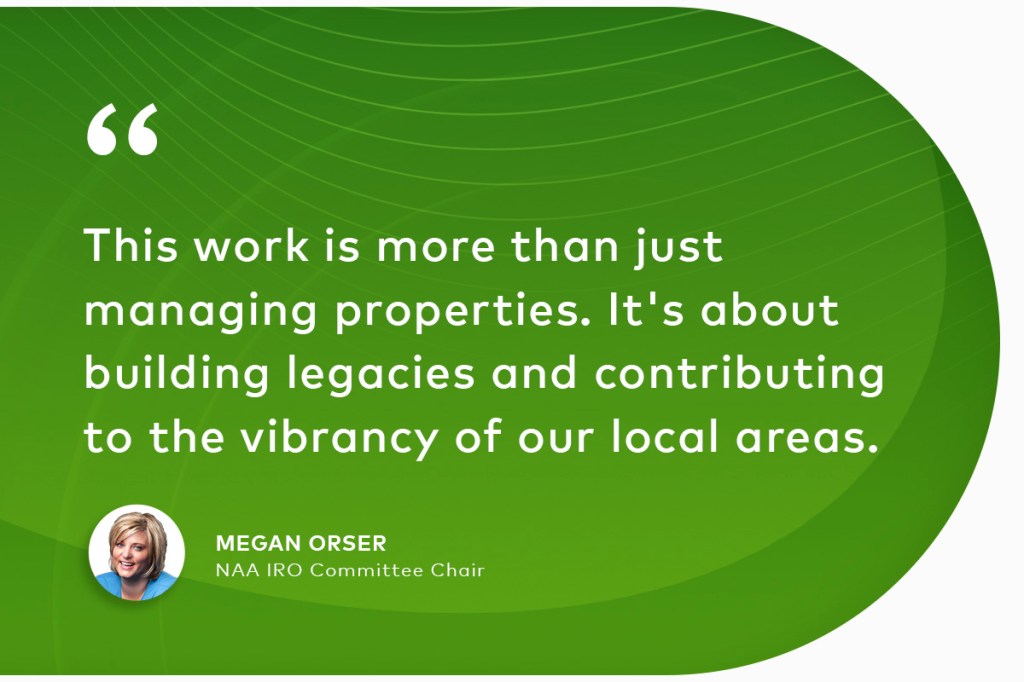
The NAA IRO Committee is currently chaired by Megan Orser, CEO at Smart Apartment Solutions and residential property manager at Smart Moves, LLC. The IRO Committee helps independent rental owners (IROs) connect, share experiences and address common industry challenges such as staffing, rising costs and changing legislation.
Megan explains why technology is crucial for IROs to stay competitive. To that end, the annual virtual IRO Summit offers educational sessions, legislative updates and live Q&A with presenters, helping IROs navigate industry complexities and build their legacies.
We spoke to Megan about all things IRO-related, including what to expected at the upcoming IRO Summit on September 19, 2024.
Meet Megan Orser, IRO Committee Chair
Interviewer: Tell us a bit about yourself.
Megan: My name is Megan Orser. I am the CEO at Smart Apartment Solutions, and the residential property manager at Smart Moves, LLC. We serve as a supplier as well as an independent rental owner and have been active in the IRO Committee since 2015, where I am currently serving as chair. Before that, I served as vice chair.
What IRO Committee does for independent rental owners
Interviewer: What is the purpose of the NAA IRO Committee?
Megan: We aim to bring more awareness to IROs, whether they are self-identifying as an IRO, new to membership, becoming investors or working with small property owners or management companies. We want them to feel like they can connect with others like themselves. Ultimately, we want to increase awareness to bring more people into our committee.
Every January, we start with a conversation about what keeps us up at night. We survey the committee, our alternate committee members and anyone interested in independent rental management. The survey asks about challenges IROs are facing and what keeps them up at night. The concerns have been fairly consistent over the years, similar to those of larger operators, such as staffing challenges and rising costs.
However, we have a unique perspective. IROs often serve multiple roles, being the leasing person, manager and sometimes even the maintenance person. Having resources and a group of people who understand the needs of IROs increases exposure for these businesses and helps solve the issues that keep them up at night.
What keeps IROs up at night?
Interviewer: What are the main concerns of IROs today, and how is NAA addressing them?
Megan: Most concerns are shared across the industry, such as fraud, staffing challenges and staying competitive in a tight employment market. These issues can be more pronounced for IROs because we often don’t have the same budgets as larger operators. With smaller properties and budgets, we have to get creative in attracting and retaining talent.
One significant concern is maintenance bench strength. Finding skilled maintenance workers and ensuring they stay proficient, especially with the increasing use of digital appliances, is a constant challenge. We often discuss how to get maintenance teams up to speed and keep them motivated to stay.
Legislation is another big concern. Like everyone else, we have to stay updated and compliant with ever-changing laws and regulations.
Succession planning comes up frequently. Many independent rental owners are thinking about the future of their assets and companies. This is crucial for continuing the legacy of their IRO brands.
NAA does a lot to address these concerns:
- Resources and training: We provide resources and training to help IROs manage their properties efficiently and keep up with industry changes.
- Advocacy: We work on legislative issues to ensure the interests of IROs are represented and protected.
- Networking and support: We create opportunities for IROs to connect, share experiences and support each other through committees and events.
- Succession planning guidance: We offer guidance and resources to help IROs plan for the future and ensure their businesses continue to thrive.
Competing with big business
Interviewer: How do IROs compete with larger companies with access to more resources?
Megan: Many of us are busy wearing multiple hats, but there are a lot of ideas and practices we’ve seen adopted from the IRO community recently.
Centralization is a hot topic in our industry, but in truth, it’s how IROs have always done business. Due to our size, we’ve had to centralize and specialize. Instead of having a jack-of-all-trades, we focus on building teams where each person specializes: one in plumbing, another in electrical, etc.
I used to think independent rental owners were more antiquated and didn’t lean into technology, but that’s not true. They are very tech-savvy and curious about technology. They want to be smart with it and avoid wasting money. By looking outside our industry, IROs have pulled in tools, automated processes and streamlined operations. These strategies allow IROs to be nimble, efficient, and competitive despite having fewer resources than larger companies.
Technology for small businesses
Interviewer: What tech does a small residential property management business need to have?
Megan: I can only speak for myself, but as a small management company, we have fully embraced technology. We’re a hybrid company with a centralized model, which is common among IROs. We work remotely, and our properties are about 45 minutes away.
We lean into technology in many ways:
- Rely on property management software to stay efficient
- Allow self-guided tours
- Install smart locks
- Communicate via text messaging
- Use generative AI
- Virtual assistants
Technology adoption in the IRO community
Interviewer: Are IROs enthusiastic about adopting new technology?
Megan: From my experience, IROs are open to adopting new technology, but there are some important considerations and expectations to manage. For instance, when I was scaling business and moving from a brick-and-mortar setup to a fully remote company, we faced many questions about technology.
One significant experience was working with an automation company to streamline one of our processes. Initially, I believed it would take 60-90 days, expecting everything to work seamlessly once implemented. However, the process actually took about two years, and it’s still something we’re refining today. Although it has greatly benefited our business, the journey was longer and more complex than anticipated.
Here are some insights based on my experience:
Manage expectations
Technology adoption often takes longer than expected. It’s not as simple as turning on a switch and having everything work perfectly. Be prepared for a longer timeline and ongoing adjustments.
Be patient but persistent
Despite the challenges, sticking with the process is worth it. The benefits of technology can significantly improve business operations.
Continuous improvement
Technology implementation is not a one-time event. It involves continuous learning and improvement. Regularly assess and refine your processes to make the most of the technology.
Share your experiences
Sharing your journey with other IROs can help them manage their expectations and learn from your experiences. It’s valuable to hear real-life examples of technology adoption.
This is the important takeaway: while the adoption of new technology can be challenging, it is definitely worthwhile. IROs who are willing to embrace the process and manage their expectations will find that technology can greatly enhance their business operations.
Common mistakes to avoid
Interviewer: What do you wish you would have known before adopting tech?
Megan: I wish I had done more research on setting realistic expectations. I believed our automation process would take 60-90 days to roll out, but it didn’t. We weren’t ready for full automation. Understanding workflows is crucial, and we underestimated this.
One valuable exercise the firm we worked with had us do was to create a detailed workflow for our processes, essentially a very detailed standard operating procedure (SOP). This took longer than expected, but it was worthwhile. We were able to eliminate unnecessary steps that were just part of our routine. By mapping it out and visualizing the customer journey, we streamlined the process, cutting it down from eight steps to four.
So, if I could have known one thing before going into the process, it would be the importance of writing workflows. Whether planning to automate or not, this workflow process was extremely beneficial. It got everyone on the same page, clarified the steps and identified unnecessary actions. This made our operations much more efficient.
Advice for people new to tech & automated workflows
Interviewer: Do you have any advice for people who aren’t used to technology?
Megan: Sure, I can share some experiences from our residents and our own onboarding process with property management software, especially moving to an online payment system. Initially, some residents were resistant and preferred the old-fashioned way, like writing checks. However, as much as 90% of our residents now pay online.
Property managers need to take technology step by step. Explain the benefits of using the technology, such as increased control, convenience and saved time. Don’t overwhelm your residents with too much information at once. Break the process down into manageable steps and revisit the conversation frequently. If possible, demonstrate the tech in person. This hands-on approach can help alleviate concerns.
Just understand that everyone has different technology barriers. Some might be hesitant to download an app, while others might struggle with login issues. Tailor your support to address individual challenges. Celebrate small wins and progress, rather than expect a complete transition overnight.
For your team, start the conversation early and check in frequently. Some team members might be quick to adopt, while others need more time and reassurance. Tailor your approach to each individual. If they’re struggling, acknowledge that technology changes frequently. As your team gets used to these changes, they will become more comfortable and adaptable.
Why attend IRO Summit?
Interviewer: What is IRO Summit and why should people attend?
Megan: IRO Summit is a free online industry event hosted by NAA and Yardi with a wide variety of educational sessions. There’s always a legislative update, which is great because independent rental owners don’t get tailor-made updates too often. If you’re an IRO or even just an NAA member, you can benefit from these updates.
In 2024, we’re addressing current topics, including technology and fraud. The presenters are available to answer attendee questions. It’s also nice that the IRO Summit is virtual, and sessions are available on demand. This means you can fit the education into your schedule. You can watch for 10 minutes, pause for a phone call and come back later. This flexibility allows you to balance your day-to-day job with learning.
Staying motivated to succeed
Interviewer: What do you find exciting about your work and the future of IROs?
Megan: I’ve been excited about IROs for a long time, especially since I joined the IRO Committee in 2015. IROs are a hearty, connected and knowledgeable group, deeply in love with their local communities and eager to give back. Their stories are rich and inspiring when you take the time to listen. We’ve been focusing on bringing a face to the IRO community, showing that we’re not a faceless group. Our members include truck drivers, teachers and many others who have invested their retirement savings into real estate to build a legacy or achieve personal goals.
The conversations IROs are bringing to the table are exciting, and we’re not going anywhere. You’ll be hearing and seeing a lot more from us! This commitment to community and sharing personal stories is what makes the future of IROs so exciting. This work is more than just managing properties. It’s about building legacies and contributing to the vibrancy of our local areas.



